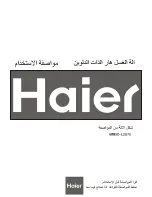
21
EN
Wash-cycle data is measured under laboratory conditions according to European Standard EN 50242.
Based on the different conditions of use, the wash-cycle duration and data can change.
Wash cycles
Wash cycle
Wash cycle
which
include
drying
Options
Approximate
duration of wash
cycles
h:min.
Water
consumption
(l/cycle)
Energy
consumption
(KWh/cycle)
1. Eco
Yes
Start Delay – Half Load - Tab
03:00
10
0,83
2. Intensive
Yes
Start Delay - Half Load - Tab
02:30
14
1,3
3. Normal
Yes
Start Delay - Half Load - Tab
02:00
13,5
1,1
4. Glass
Yes
Start Delay - Half Load - Tab
01:40
10
0,95
5. Rapid
No
Start Delay – Tab
00:25
8,5
0,5
6. Prewash
No
Start Delay – Half Load
00:10
4,0
0,01
Instructions on wash-cycle selection and detergent dosage
1.
Normally soiled crockery. Standard program, the most efficient in terms of its combined energy and water consumption.
4 gr/ml**+ 21 gr/ml – 1 Tab
(**Quantity of pre-washing detergent)
2.
Recommended program for heavily soiled crockery, specially suitable for pans and saucepans (not to be used for delicate items).
25 gr/ml – 1 Tab
3.
Normally soiled crockery. 4 gr/ml**+ 21 gr/ml – 1 Tab
4.
Cycle for delicate items, which are more sensitive to high temperatures, for example glasses and cups. 25 gr/ml – 1 Tab
5.
Fast cycle to be used for slightly dirty dishes, with no dried-on food. (ideal for 2 place settings) 21 gr/ml – 1 Tab
6.
Crockery to be washed later.
No detergent
Standby consumption: Left-on mode consumption: 5 W - Off mode consumption: 0.5 W.
















































